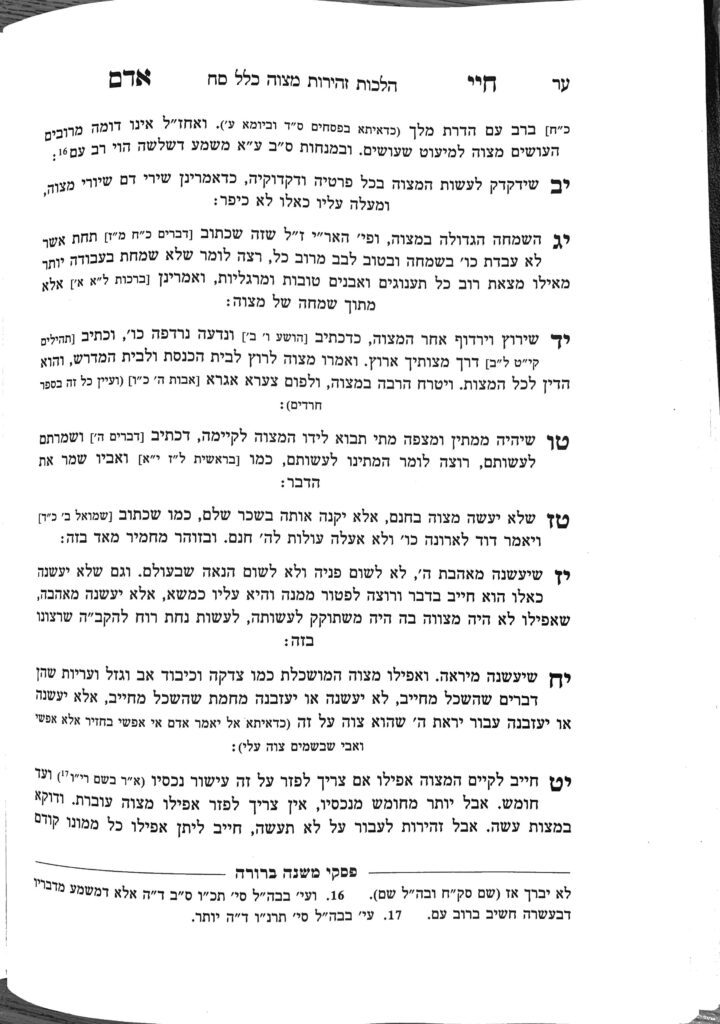We are continuing in siman 19, which discusses spending money for mitzvos. We left off discussing the chiyuv of an individual to travel for a mitzvah, and the question of the Chayei Adam whether a person is chayav to travel before the zman of the mitzvah has begun.
The Chayei Adam brings a Gemara in Zevachim which says that the chiyuv of korban pesach is only in effect from after chatzos on Erev Pesach. Therefore, if someone has a close relative who is niftar before chatzos, they become an onein and are patur from korban pesach. In Pesachim 69a, Rashi says that before the zman of the korban pesach, one does not yet have a chiyuv. From these Gemaras, it would seem clear that there is no chiyuv to seek out a mitzvah until it’s zman. However, this thought process is difficult to understand, because if one is not chayav in a mitzvah until its zman begins, one would be patur from procuring a sukkah, lulav, and many other mitzvos, and then be an anus when the zman of the mitzvah comes
The Nesivos Hamishpat wrote a sefer on Pesach called the Mekor Chaim. The Mekor Chaim brings a proof from Chullin that a person is chayav to seek out mitzvos. The Gemara brings that regarding shiluach hakein, the pasuk says ki yikarei, a person is only chayav when they happen to chance upon a nest. We see from the Gemara that the reason a pasuk is needed is because a person would otherwise think that they are chayav to search high and low to find a nest. The implication regarding other mitzvos, however, if that one is chayav to seek them out, i.e., procure them even before their zman . The Torah specifically writes an exemption regarding shiluah hakein, but it would not apply to other mitzvos.
Rabbi Reingold’s brother-in-law’s father-in-law, Rabbi Avraham Bayarsky, was a talmid of the yeshiva in Radin. In 1940, when the yeshiva was invaded by the Russians, the bochurim went to Lithuania, which was still independent at that time. He spent Rosh Hashanah, Yom Kippur and Sukkos in Telshe. Due to the war, many smaller towns had not been able to procure a set of daled minim, but Telshe was successful in procuring one set. The Telshe’s Rov’s Shabbos Shuva drasha centered around whether the bochurim were allowed to return to their families in these smaller towns after Yom Kippur, where they would end up without a set of daled minim for Yom Tov. His drasha was based on this Chayei Adam and the question of whether they have a chiyuv to seek out a mitzvah before the zman of the mitzvah has begun. Rabbi Reingold does not recall the final outcome of the Telshe Rov.
There are other proofs to this question. For example, Tosfos, at the beginning of Pesachim, discusses whether a person was chayav to bring themselves to Yerushalayim to become chayav in korban pesach, or whether the chiyuv only took effect if a person happened to have been in Yerushalayim. The Gemara seems to imply that certain towns did not go to Yerushalayim, and the achronim grapple with our question in understanding this Gemara.
Summary
In the same way a person must spend money to perform a mitzvah, they must exert tircha as well. Although the Chayei Adam suggests ways to limit the chiyuv to exert tircha, they are debatable.



